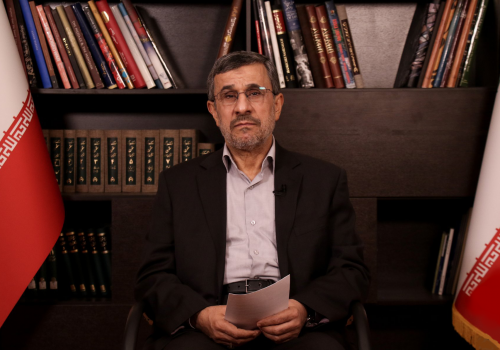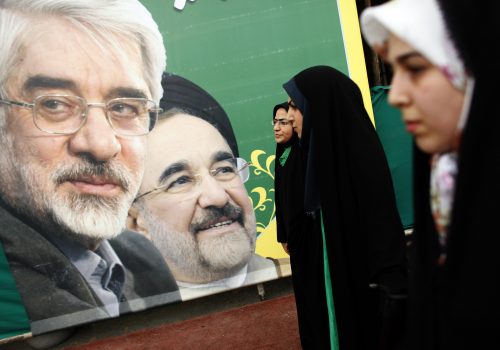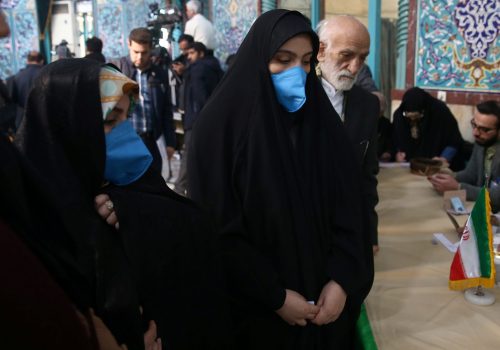Parviz Fattah: The new Ahmadinejad that may be running for president
No one was prepared for the avalanche of information Parviz Fattah unleashed during a live interview with Iran’s national broadcaster on August 8. The 59-year-old former energy minister named several top political personalities and organizations, including military bodies, who were using Mostazafan Foundation properties, an organization Fattah now heads, without paying proper rent.
Contrary to its humble name, the Mostazafan Foundation—a parastatal behemoth tasked with helping “the oppressed”—is one of the largest commercial enterprises in the Middle East. Its declared assets are over 560 trillion Iranian rials (coming to around $2.4 billion even with today’s low exchange rates). It runs mobile networks, energy companies, hotel chains all over Iran (and even one in Dubai). Unsurprisingly, it has also been a storied den of grift and corruption.
The list of Fattah’s targets seemed to have been strategically picked to hit all sides of the political spectrum. Those accused of using the Mostazafan Foundation real estate included former presidents Mahmoud Ahmadinejad and Mohammad Khatami, top female officials in President Hassan Rouhani’s administration—Masoumeh Ebtekar and Shahindokht Molaverdi—and, perhaps most consequentially—and for reasons explained below—Gholam Ali Haddad-Adel, a former speaker of parliament and father to the Supreme Leader’s daughter-in-law. More surprisingly, Fattah even named sections of the Islamic Revolutionary Guard Corps (IRGC) and the army in his long list of accusations.
The fact that political personalities and quasi-state bodies in Iran use Mostazafan Foundation properties with dubious origin is no news. The foundation’s history explains its enviable portfolio of choice real estate in Tehran. It was founded in February 1979, less than a month after the victory of the Iranian revolution brought Ayatollah Ruhollah Khomeini to power. The revolutionary leader confiscated everything owned by the deposed monarchy and those connected to it and, crucially, asked for their ownership to pass on notto the government, but to the Revolutionary Council, which was the seat of Khomeini’s own power. This laid the basis for the Mostazafan Foundation’s autonomy from the government, with its head being solely accountable to the Supreme Leader and its large holdings including vast swathes of land and real estate that had once belonged to the Pahlavi dynasty, whose founder, Reza Pahlavi, had, in turn, confiscated them from Iran’s nobility earlier in the century.
Fattah’s revelations seemed to have been particularly designed to embarrass his opponents. Why should Ahmadinejad hold offices in the upscale Velenjak neighborhood in northern Tehran and not the working-class southern quarters of the city, he asked. Why is Haddad-Adel not paying proper rent for the grounds which he has used to build a luxurious private high school where some of his own family members are employed?
Prior to his 2019 appointment by Supreme Leader Ayatollah Ali Khamenei as the head of the Mostazafan Foundation, Fattah has long had similar jobs. From 2015 to 2019, he headed the public charity Imam Khomeini Relief Foundation—another parastatal behemoth whose long arms extend into many regional countries such as Lebanon. From 2009 to 2015, he headed a foundation for the IRGC, the powerful militia that controls much of the Iranian economy. What explained Fattah’s newly founded interest in transparency? According to most pundits, there could only be one plausible explanation. Tehran University professor Sadegh Zibakalam spoke for many when he said: “Fattah just registered to run in the 2021 presidential elections.”
That would explain the attacks on potential rival candidate Ahmadinejad, who has populist pedigree in regard to attacks on elites, and on Haddad-Adel, who is a key figure in the rowdy conservative camp.
Fattah, the new Ahmadinejad?
It’s not the first time that Fattah’s name has been suggested as a candidate for high political office. As an able technocrat who has run massive financial enterprises and is loyal to Khamenei, he is in many ways an ideal candidate for a regime that finds itself in dire economic straits. His long past in the IRGC, which he joined in the early years of the revolution, is also an important factor. It helps that he is not one of the familiar names of the conservative camp like former parliamentary speakers Ali Larijani or Haddad-Adel. Therefore, he could pose as a new face with clean hands.
Fattah also has a couple of personal selling points that might help his popularity with some of the population, though a low presidential election turnout in 2021 is expected regardless. He hails from a small village in northwestern Iran and has a Turkic ethnic background, like up to 40 percent of the country. It doesn’t hurt that he, like Khamenei, is a seyed, a descendant of the Prophet Mohammad, which affords him a certain popularity with sections of the populace.
In 2016, as the conservative camp was searching for the ideal candidate against President Rouhani, Fattah made it to the five-person shortlist, but he resigned early on when it became clear he had little chance of winning the informal conservative primaries. In the last four years, he has made a few public gimmicks that signaled political intentions. Three years ago, while on a popular talk show, Fattah took a turbah, a clay tablet used by the Shia in their prayers, out of his pocket and did an Islamic prostration to thank God for people’s participation in a charity campaign. In 2019, he was photographed helping victims of widespread floods, though it looked more like he was showing off. More recently, in the days that followed the US assassination of General Qasem Soleimani, the fabled head of the IRGC’s foreign operations, Fattah told stories of his close collaboration with the slain commander and boasted about having used the foundation he used to head to help Soleimani pay for a brigade of Afghan soldiers fighting in Syria, which is an illegal act.
Despite his constant denials, it is reasonable to believe Fattah is planning a presidential run. A source close to the leadership of the Islamic Iran’s Endurance Front (IIEF), an ultraconservative political party, told me that Fattah had unofficially asked for the front’s endorsement.
No appetite for populism
However, the regime’s leadership, seems to be wary of Fattah’s populist gimmicks, having burnt its hand with the adventurism of Ahmadinejad. The reactions to Fattah’s televised words were swift and might have derailed any hopes he had. Haddad-Adel gave a swift response and said that he had taken all the properties he used with the permission of Khamenei; Haddad-Adel is an in-law due to his daughter’s marriage to the supreme leader’s most politically relevant son, Mojtaba. Additionally, an editorial in regime mouthpiece Kayhan decried Fattah and the publisher of the IRGC-linked Javan newspaper tweeted that he was “helping the enemy.”
As a result, Fattah crumbled pretty fast. On August 19, he made a humiliating public apology, saying that his words had been “mistaken,” “incomplete,” “imprecise,” and “unjust.”
An unrelated incident also further hurt Fattah’s image. On August 26, security forces attacked the people of Abolfazl village in southwestern Iran in an attempt to demolish their homes. Tear gas and rubber bullets were used and lead to injuries. The forces were there because the land used by the villagers allegedly belonged to the Mostazafan Foundation. Fattah defended the actions. An Ahvaz member of parliament implicitly pointed to the main reason for the demolitions—the village was close to an air defense unit in Ahvaz. The incident was especially jarring when juxtaposed with Fattah’s apology. It laid bare the fact that that the Foundation of the Oppressed served the powerful men of the regime and not ordinary villagers. To add insult to the injury, the house demolitions took place during the holy days of Muharram, as the Shia mourned the unjust killing of Shia Imam Hossein and his comrades in 680 AD, including his younger brother Abolfazl, for whom the village was named.
An editorial in Jomhooriye Eslami, a leading newspaper, had a message for Fattah: “If you want to apologize to the right people, apologize to the people of Abolfazl village. Go kiss their hands.”
Arash Azizi is a writer and scholar based at New York University. He is the author of the upcoming book, “The Shadow Commander: Soleimani, the US and Iran’s Global Ambitions” which will be published by Oneworld Publications in November. Follow him on Twitter: @arash_tehran.
Image: Iran's Minister of Energy Parviz Fattah addresses the media during the 5th World Water Forum in Istanbul March 20, 2009. REUTERS/Stringer


